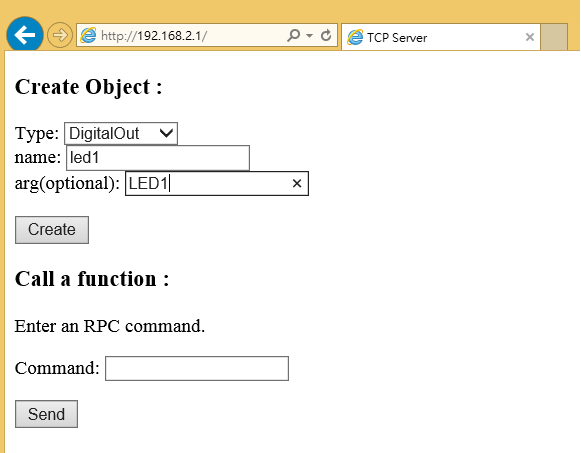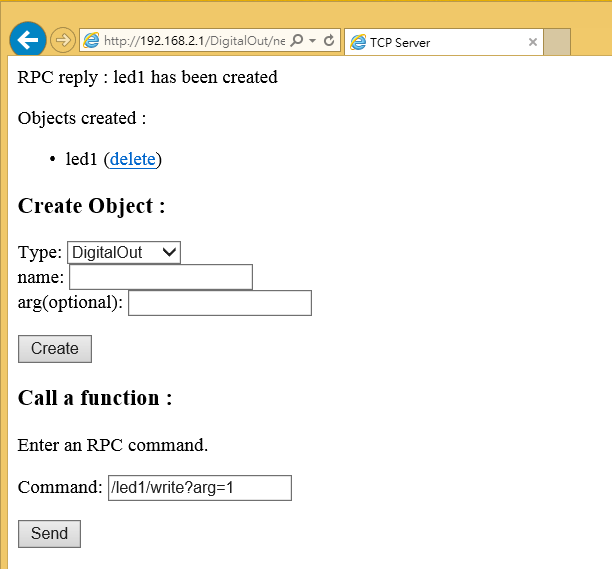NNN40 run a HTTP server with RPC using Soft AP mode
Dependencies: WIFI_API_32kRAM mbed
Fork of HTTP-Server by
The sample code will run as a WiFi Soft AP mode with given AP configuration setting including SSID name and password. IP address (fixed to 192.168.2.1 for the current version of WIFI_API)of AP router will be print out once Soft AP mode is operating.
User can open their web browser and go to http://192.168.2.1/. and have a try on switch on a led. Firstly, we need to create an object to control a led

Then, led can be switch on using RPC command

More information cab be found from the links below
https://developer.mbed.org/users/feb11/code/HTTP-Server/
https://developer.mbed.org/cookbook/Interfacing-Using-RPC
HTTPServer.cpp
- Committer:
- wgd8700
- Date:
- 2015-09-16
- Revision:
- 11:f57e9de44f6f
- Parent:
- 9:a9bf63017854
File content as of revision 11:f57e9de44f6f:
#include "HTTPServer.h"
#define INVALID_FORMATTER "No valid formatter specified"
bool cmp(char* a, char* b)
{
return strcmp(a,b) < 0;
}
HTTPServer::HTTPServer(Formatter *f):
socket(),
handlers(&cmp),
formatter(f),
reply(),
command()
{
}
HTTPServer::~HTTPServer()
{
for(std::map<char*, RequestHandler*>::iterator itor = handlers.begin();
itor != handlers.end();
++itor)
delete itor->second;
if(formatter)
delete formatter;
}
bool HTTPServer::init(int port)
{
socket.set_blocking(true);
if(socket.bind(port))
{
printf("Could not bind on port %d.\n", port);
return false;
}
if(socket.listen())
{
printf("Could not listen %d\n", port);
return false;
}
return true;
}
void HTTPServer::run()
{
TCPSocketConnection c;
while(true)
{
while(socket.accept(c));
c.set_blocking(false, 1000);
while(c.is_connected())
{
char buffer[512];
int n = c.receive_all(buffer, sizeof(buffer)-1);
if(n == 0)
{
c.close();
break;
}
else if(n != -1)
{
printf("Received data\n");
buffer[n] = '\0';
handle_request(buffer);
if(formatter != NULL)
{
printf("Sending data...");
char *page = formatter->get_page(reply);
do
{
c.send(page, strlen(page)+1);
page = formatter->get_page(reply);
}while(strlen(page)>0);
printf("done\n");
}
else
c.send(INVALID_FORMATTER, strlen(INVALID_FORMATTER)+1);
}
else
printf("Error while receiving data\n");
}
}
}
void HTTPServer::handle_request(char *buffer)
{
char *request_type = strtok(buffer, " ");
char *request = strtok(NULL, " ");
reply[0] = '\0';
if(!strcmp(request, "/"))
return;
if(!command.decode(request))
{
strcat(reply, "Malformed request");
return;
}
std::map<char*, RequestHandler*>::iterator itor = handlers.find(request_type);
if(itor == handlers.end())
{
strcat(reply, "No request handler found for this type of request.");
return;
}
if(itor->second != NULL)
itor->second->handle(command, reply);
else
strcat(reply, "Invalid request handler");
}
void HTTPServer::add_request_handler(char *name, RequestHandler* handler)
{
handlers[name] = handler;
}
